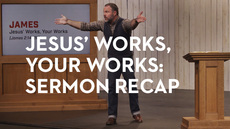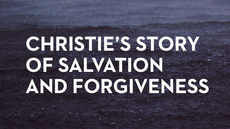Not many of you should become teachers, my brothers, for you know that we who teach will be judged with greater strictness. 2 For we all stumble in many ways. And if anyone does not stumble in what he says, he is a perfect man, able also to bridle his whole body. 3 If we put bits into the mouths of horses so that they obey us, we guide their whole bodies as well. 4 Look at the ships also: though they are so large and are driven by strong winds, they are guided by a very small rudder wherever the will of the pilot directs. 5 So also the tongue is a small member, yet it boasts of great things.
How great a forest is set ablaze by such a small fire! 6 And the tongue is a fire, a world of unrighteousness. The tongue is set among our members, staining the whole body, setting on fire the entire course of life, and set on fire by hell. 7 For every kind of beast and bird, of reptile and sea creature, can be tamed and has been tamed by mankind, 8 but no human being can tame the tongue. It is a restless evil, full of deadly poison. 9 With it we bless our Lord and Father, and with it we curse people who are made in the likeness of God. 10 From the same mouth come blessing and cursing. My brothers, these things ought not to be so. 11 Does a spring pour forth from the same opening both fresh and salt water? 12 Can a fig tree, my brothers, bear olives, or a grapevine produce figs? Neither can a salt pond yield fresh water.
Introduction
“Loose lips sink ships.” During World War II, this slogan appeared on propaganda posters created and distributed by a major American distiller. The slogan advised servicemen and other American citizens to avoid careless talk about secure military information. Speaking openly about knowledge of a ship’s course might allow the enemy to intercept and destroy American naval ships. Likewise, careless and uncontrolled speech can bring much destruction.
James’ point is that loose talk and self-control are interconnected. Once a word is spoken, we can’t take it back. While we may not attack someone with our fists, our words can still cause major damage even from far away. Our tongue can speak blessing and cursing, life and death. Jesus tells us our mouth speaks about what ultimately fills our heart (Luke 6:45). An evil heart speaks evil, a redeemed heart speaks goodness. The problem with our tongue, then, is really a problem with our heart.
When we turn our heart to Jesus, he changes our words. Our tongue then glorifies the one and only Son. Only Jesus tames our tongue.
Observation
- Whom does James directly address in this passage, and what is the warning to them (v. 1)? How does the remainder of the passage relate to the first verse? How does it relate to what we’ve studied in James in prior lessons
- What three metaphors does James use to describe the tongue? What do these metaphors have in common? How are they different?
- With our tongue, we do what two contradictory things (v. 9–10)? What imagery does James use to visualize this contradiction (v. 11–12)?
Interpretation
- Church scholars believe that in the early church, all were allowed to teach in turns—which gives James 3:1 great significance. Why would many of them (and us) want to teach? What does Romans 12:6–7 reveal about the role of teaching?
- In James 3:3–4, what common verb describes the function of the two metaphors for the tongue (i.e., the bit and the rudder)? What does James imply is the role of our tongue in relation to our personality and actions? How does Proverbs 18:21 reinforce this idea?
- While James shows us the function of the tongue in verses 3–4, he writes of the destructiveness of an unrestrained tongue in verses 6–8. What are the nine negative descriptions used for the tongue? When you read these descriptions consecutively, what common imagery do you see? How does James use this imagery to give weight to the destructive power of the tongue?
- Double-mindedness is a common theme in James (see James 1:10–11, James 4:8). In James 3:9–12, we see our ability to be “double-tongued.” How do Genesis 1:26 and 1 John 4:20 elaborate on why as James says “this should not be” (v. 10)?
Application
In James 3:6, the tongue is described as being “itself set on fire by hell.” The Greek word used for hell in the original text is Gehenna, which refers to an actual place south of Jerusalem called the Valley of Hinnom. Jeremiah 32:35 describes the Valley of Hinnom as the location where people once sacrificed their children to the pagan god, Molech. In the time of James, this valley was the site of the city dump, always smoldering from the combustion created by decomposing organic material. When we think of our tongue as “itself set on fire by hell,” we must consider the effect our words can have on others.
- Recall a recent instance where your tongue was not tamed. How did it corrupt your whole body and the course of your life (James 3:6)? After reading this section of James, how do you better understand the importance of your tongue and the words you use?
- James 3:8 says that “no human being can tame the tongue.” On our own, we cannot tame our tongue, but the Holy Spirit will help us. Romans 8:1–2 says, “There is therefore now no condemnation for those who are in Christ Jesus. For the law of the Spirit of life has set you free in Christ Jesus from the law of sin and death.” Do you feel helpless to tame your tongue? How can the freedom you have in Jesus change this?
- What are some ways we use our tongues for evil? What are some ways we can use our tongues for good?
- Read Romans 2:17–23 and 1 Timothy 1:5–7. We may not all have opportunity to teach large groups, but many of us give counsel to friends and family members. How do these verses caution those who teach or counsel?
This devotion is adapted from the James Study Guide. Pick up a copy today for only $9.99. The Study Guide includes a 15-week curriculum, a small group study, a group inductive study, as well as 75 daily devotions for your personal or family worship.
















